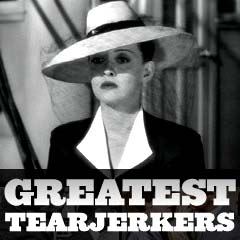|
The Greatest Tearjerkers of All-Time
|
|
Title Screen
|
Movie Title/Year and Brief Tearjerker Scene Description
|
Screenshots
|
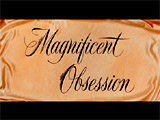
|
Magnificent Obsession (1954)
 #84 #84
- the long-overdue reunion scene in which reckless,
rude and wealthy playboy Dr. Bob Merrick (Rock Hudson), who had
portrayed himself as a poor medical student named Robbie Robinson,
was warmly greeted, hugged and kissed by Helen Phillips (Jane
Wyman), the blinded widow of Dr. Wayne Phillips (whose death he
had indirectly caused); although she
knew his real identity, she had fallen in love with him
- he promised
that she would have "the time of your life" with him ("I
want to take you to all the places you've been too busy to visit
and show you how to have fun"), and to help her adjust to her
blindness: "Let
me be your eyes again"; he urged
her to get dressed up ("I'm not only gonna show you the town,
I'm gonna show the town you!"), and it was obvious that she
was buoyed by his presence
- and the concluding scene
in which Helen woke up from her successful, complex sight-restoring
brain surgery operation performed by Dr. Merrick himself (who had
become a doctor to make amends and right all the wrongs in his
life), and told him that she thought her sight had been returned:
"It doesn't hurt so much." He reassured her: "You're
going to get better." Grateful that Bob was there, she asked him
to hold her close, and then hoped: "I think I see some light...But
I'm going to see, I know I am. Am I?" He replied: "Yes, my
darling. You are going to see." Although told to be quiet and
not to get too excited, she asked: "May I, may I get excited tomorrow?...And
you'll be with me?" He
responded positively: "Yes, darling, I'll be with you tomorrow.
Starting tomorrow, we'll never be apart."
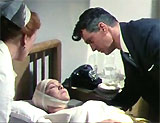
|
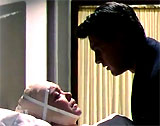
|
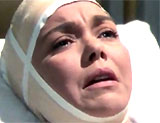
|
|
Post-Brain Surgery Operation
|
- the inspiring words regarding service and self-sacrifice
of famous artist Edward Randolph (Otto Kruger), Dr. Phillips'
close friend (who was also in the hospital), were recalled in Dr.
Merrick's mind, when delivered in the film's final line (in voice-over):
("Once
you find the way, you'll be bound. It will obsess you. But believe
me, it'll be a magnificent obsession")
|
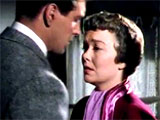
Dr. Merrick (Rock Hudson) with Blinded Widow Helen Phillips (Jane Wyman)
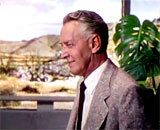
"It'll Be a Magnificent Obsession"
|
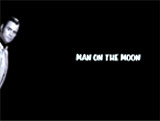
|
Man on the Moon (1999)
- the excruciating scenes of abrasive comedian
and practical joker Andy Kaufman (Jim Carrey) on stage - with unconventional,
bizarre, improvised, anti-humor comedy routines that were intentionally
unfunny
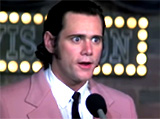
On Stage - Intentionally Unfunny
|
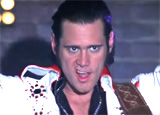
(Elvis Impersonation)
|
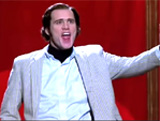
Kaufman (Jim Carrey) - Mighty Mouse Song
|
- the attempts of Kaufman to cure his lung cancer
with various quackery and miracle remedies, such as New Age crystals,
Philippine Islands faith healers, etc, and ironically realizing
that the cures were only a hoax (similar to Kaufman's own routines)
- the sing-along at Andy Kaufman's funeral of mourning
friends and loved ones singing "This Friendly World,"
along with his huge projected b/w video behind his open casket
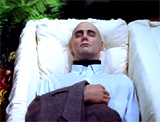
Open Casket Funeral For Andy Kaufman
|
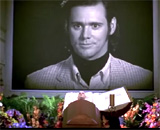
B/W Video of Kaufman Behind Casket
|
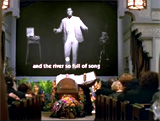
Funeral Sing-Along With Bouncing Ball Lyrics
|
- the poignant final scene staged as a tribute to
Andy Kaufman a year after his death in 1985, performed at the Comedy
Store, when one of Kaufman's most famous characters
- the rude "Tony
Clifton" lounge
singer character - was portrayed on stage; Kaufman's creative
writing partner and friend Bob Zmuda (Paul Giamatti), Kaufman's 'alter
ego') gave a costumed creation of a comeback appearance ("You
guys wanna see Andy tonight? Anybody got a flashlight and a couple
of shovels? OK guys, let's do our dirt"); he defiantly sang: "I
Will Survive" -
as Zmuda also looked on in the audience (seen after a pan to the
left)!

|

|

|
|
Comedy Club - Bob Zmudas' Performance of Kaufman's
'Tony Clifton' lounge singer character
|
- the film ended with music group R.E.M.'s singing
of their 1992 hit "Man on the Moon" as a tribute to Kaufman: ("Mott
the Hoople and the Game of Life (yeah, yeah, yeah, yeah) Andy Kaufman
in the wrestling match (yeah, yeah, yeah, yeah) Monopoly, twenty-one,
checkers, and chess (yeah, yeah, yeah, yeah)...")
|

Kaufman - as "Tony Clifton" - Lounge Singer
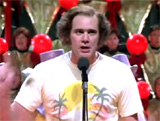
"Milk and Cookies" Carnegie Hall Appearance with the Rockettes
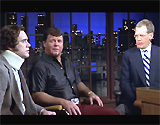
Staged Feud Between Kaufman (In Neck Brace) and Wrestling Opponent Jerry
Lawler - on The David Letterman Show
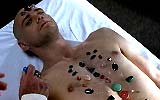
Quack Remedies To Cure Kaufman's Lung Cancer
|

|
Manhattan (1979)
- the heartbreaking scene when
42 year-old Isaac Davis (Woody Allen) proposed a breakup with
his 17 year-old girlfriend Tracy (Mariel Hemingway): ("Now
I don't feel so good") in a malt-soda shop
with Tracy's tearful rejection of his attempts to get her to stop
crying ("Leave me alone")
- the scene of Isaac stretched out
on a couch recounting all the things that he genuinely loved (his
jazz, acting, and sports heroes, and Tracy's face): ("My idea
for a short story about, uhm, people in Manhattan, who, uh, are constantly
creating these real, unnecessary neurotic problems for themselves,
'cause it keeps them from dealing with more unsolvable, terrifying
problems about the universe. Uhm, let's, uh, well, it has to be optimistic.
All right, why is life worth living? That's a very good question. Um... Well, there
are certain things I guess that make it worthwhile, uh... Like what...
okay... um... For me, uh... ooh... I would say... what, Groucho Marx,
to name one thing... uh... um... and Willie Mays... and um... the
2nd movement of the Jupiter Symphony... and um... Louis Armstrong,
recording of Potato Head Blues... um... Swedish movies, naturally...
Sentimental Education by Flaubert... uh... Marlon Brando, Frank Sinatra...
um... those incredible Apples and Pears by Cezanne... uh... the crabs
at Sam Wo's... uh... Tracy's face...")
- Isaac made a breathless run through NY streets
to stop his (now) eighteen year-old drama student/girlfriend Tracy's
departure by plane for London to study at the Academy; in their romantically
poignant and touching final scene, the young lover (now 18) consoled
a fearful Isaac - she was
leaving for London for six months, with a bittersweet line: ("Six
months isn't so long. Everybody gets corrupted. You have to have
a little faith in people")
- the concluding shot of Isaac's face with a wry,
resigned smiling expression (a farewell version of The Tramp's
(Charlie Chaplin) expression in City Lights
(1931)), followed by a reprise of the opening montage featuring
the skyline from dawn to dusk to Gershwin's "Rhapsody in Blue"
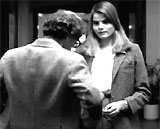
Tracy's Departure: "You have to have a little
faith in people"
|
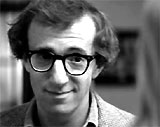
Isaac's Concluding Smile
|
|


Tracy's Reaction to Break-Up in Soda Shop: "Now I don't
feel so good"
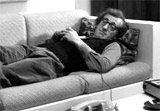
"Why is Life Worth Living"
|
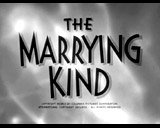
|
The Marrying Kind (1952)
- the tragic family picnic scene
in which Joey (Christopher Olsen), the six-year old son of bickering
couple Florrie (Judy Holliday) and Chet (Aldo Ray), accidentally
drowned in a park pond while an oblivious Florence was singing "How
I Love the Kisses of Dolores" on a ukelele to her husband; she
finally sensed what had happened when she was alerted to the tragedy
by a pointing child
|

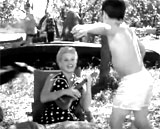
Florrie Singing With Ukelele

Drowning Death of Her 6 Year-Old Son Joey
|

|
Mask (1985)
- the relationship between
teenager Roy "Rocky" Dennis (Eric Stoltz), who suffered from lionitis
or craniodiaphyseal dyaplasia (a skull deformity), and his drug-abusing
and depressed biker gang mother Florence "Rusty" Dennis (Cher)
- "Rocky's" close relationship with blind friend Diana
Adams (Laura Dern), although her disapproving parents were against
him (for his deformed looks) and humiliated him when they first met
him (as they drove off, he spoke under his breath: "That damn son-of-a-bitch")
- and later prevented her from receiving communications from him
- Rocky's death while sleeping due to his disfigurement
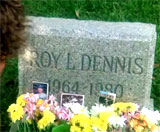
|
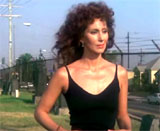
|
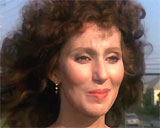
|
|
"Rusty"'s Remembrance of Her Son "Rocky" (Roy)
|
- the concluding scene at "Rocky's" gravesite,
when "Rusty," Gar
(Sam Elliott) and Dozer (Dennis Burkley) visited, and left flowers
and ball-cards (1955 Brooklyn Dodgers) near his tombstone, followed
by "Rocky's" voice-over of an original poem recitation
- "Rusty's"
sad remembrance of her son: ("These things are good: ice cream
and cake, a ride on a Harley, seeing monkeys in the trees, the rain
on my tongue, and the sun shining on my face. These things are a
drag: dust in my hair, holes in my shoes, no money in my pocket,
and the sun shining on my face")
|
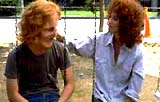
"Rocky" with His Mother "Rusty"
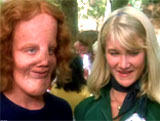
"Rocky" with Blind Friend Diana (Laura Dern)
|
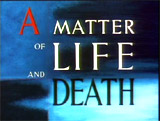
|
A Matter of Life and Death (1946,
UK) (aka Stairway to Heaven (1946, US))
 #86
#86
- the opening sequence of a radio
distress call in May of 1945 by squadron leader Peter D. Carter
(David Niven) delivered within a burning British RAF bomber plane
that had lost its undercarriage and the rest of the crew; as he delivered
his final message, he fell in love with American WAC radio operator
June (Kim Hunter): ("I'm bailing out, but there's a catch.
I've got no parachute....Hello, June, don't be afraid. It's quite
simple. We've had it and I'd rather jump than fry. After the first
thousand feet, what's the difference. I shan't know anything, anyway.
I say, I hope I haven't frightened you...June, are
you pretty?...Can you hear me as well as I hear you?...You've got
a good voice. You've got guts, too. It's funny. I've known dozens
of girls, I've been in love with some. But an American girl who I've
never seen and never shall see will hear my last words. That's funny.
Rather sweet. June,
if you're around when they pick me up, turn your head away...No,
no-one can help. Only you. Let me do this in my own way. I want to
be alone with you, June...I love you, June, you're life and I'm leaving
you...I'll be a ghost and come and see you! You're
not frightened of ghosts?...I was lucky to get you, June. Can't be
helped about the parachute. I'll have my wings soon, anyway, big
white ones...I'm signing off now, June. Goodbye. Goodbye, June")
- the subsequent meeting of Peter - still mistakenly
alive - and June riding on a bike near the military base after he
parachuted and washed up on a beach: ("You're Peter! How did you
get here? I'm glad you're safe. What did you do? What happened?...
Are you hurt?...There's a little cut in your hair. Oh, Peter, it
was a cruel joke.... I've been crying ever since we said goodbye")
- there was a discrepancy reported in heaven's celestial
court: ("91,716 invoiced, 91,715 checked in") - as Conductor
71 (a guillotined French Revolution aristocrat), an Other World escort,
explained the problem: ("Everything was calculated except for
the accursed fog! The pilot jumped, he got lost in the fog, I missed
him")
- the view of the marvelous ascending stairway into
the heavens (the heaven sequences were filmed in B/W) lined with
statues of famous people (Lincoln, Plato, Richelieu, Solomon), as
Peter and Conductor 71 rode up - the statues represented potential
counsels for Peter for his upcoming trial, but Peter balked at all
of them: ("It sounds a grand idea to have all these great men
to choose from, but what do they know of our problems today?...Besides,
I think it ought to be an Englishman. Nobody famous, but somebody
with his head screwed on all right")
- during brain surgery to rid
him of alleged hallucinations, Carter's spirit was put on trial --
(in b/w) -- to appeal his death before a celestial court, and to
prove that he should remain on Earth rather than journey on to the
afterlife; the image of one of June's single, glittering love tears
caught on the petals of a pinkish rose was to be used as "the only
real bit of evidence we have" by Carter's recently-deceased British
counsel and friend Dr. Reeves (Roger Livesey) in the case prosecuted
by Abraham Farlan (Raymond Massey), an American
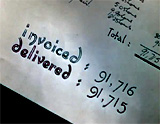
Heavenly Discrepancy
|
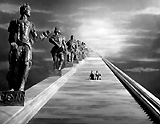
|
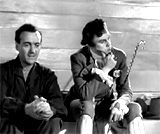
Stairway to Heaven
|
- the profoundly romantic,
tearjerking sentimental ending in which the two lovers were asked
in Heaven to prove their love for one another, and June affirmed that
she was willing to "die for him" and would "take his
place in the balance sheet" - she proved it by proposing to
take Carter's place when the stairs to the Other World started to
move upward and separated the lovers
|
"Nothing is Stronger Than Love"
|
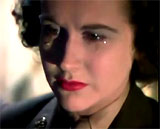
|
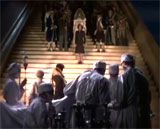
|
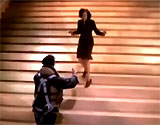
|
|
June: "Goodbye darling"
|
June's Self-Sacrifice -
Leading to Peter's Winning of Appeal to Live
|
- a tearful June and Carter stared
at each other (with a close-up of the
tearful June as she said 'goodbye darling'), but then with a jolt,
the stairs stopped; Dr. Reeves informed the assembly watching that "nothing
is stronger than the law in the universe, but
on Earth, nothing is stronger than love"
- in the film's ending, June ran down the stairs
to embrace Carter, after having his appeal granted and he was given
a long life by the court
- words of Sir Walter Scott were intoned
by God/the Judge (Abraham Sofaer): ("Members of the jury, as
Sir Walter Scott is always saying, 'In peace, love tunes the shepherd's
reed; in war, he mounts the warrior's steed; in halls, in gay attire
is seen; in hamlets, dances on the green. Love rules the court, the
camp, the grove, and men below and saints above. For
Love is heaven, and heaven is Love'")
|
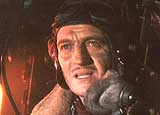
RAF Pilot Peter Carter's Radio Distress Call
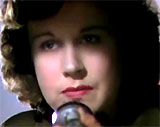
Radio Operator June
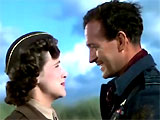
Peter Meeting June On Beach After Jumping From Plane
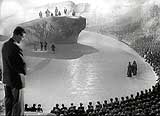
Ascending Stairway Into the Heavens
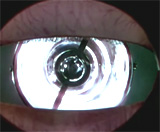
Eyelid POV shot
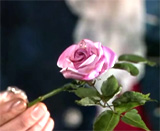
June's Love Tears Caught on Pink Rose Petals
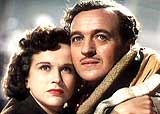
Peter and June Together
|
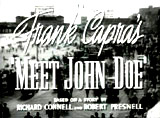
|
Meet John
Doe (1941)
- the melodramatic final scene of
common man "John Doe" (Gary Cooper) threatening to jump off
City Hall on a snowy Christmas Eve in which reporter Ann Mitchell
(Barbara Stanwyck) hysterically sobbed and urgently begged him not
to kill himself - and admitted her love for him: ("I won't let
you, I love you, darling")
- the upbeat
conclusion in which John Doe walked away from the ledge toward his
supporters with Ann in his arms, after the John Doe club members
had renewed their faith in him and he had decided to not commit suicide
- accompanied by Beethoven's Ninth Symphony. Managing
editor Henry Connell (James Gleason) (with his fist) told off the
oppressive and evil Norton in the final line: ("There you are,
Norton! The people! Try and lick that!")
|
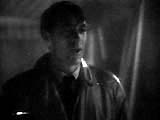
'John Doe' Threatening Suicide
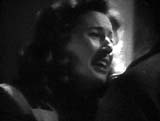
Ann's Declaration of Love for 'John Doe'
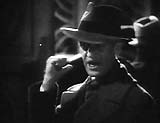
"There you are, Norton! The People! Try and lick that!"
|
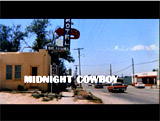
|
Midnight Cowboy (1969)
 #100
#100
- the scene of Joe Buck (Jon Voight)
wiping off the sweaty head of ailing friend Enrico "Ratso" Rizzo
(Dustin Hoffman) in a stairway before attending an underground film-making
party in Greenwich Village
- the scene of Joe caring for his ailing feverish friend
Ratso, who was suffering from the end stages of tuberculosis, and
admitting that he was afraid of not being able to walk anymore: ("You
know what they do to you when they know you can't... When they find
out that you can't wa... walk. Oh, Christ!")
- Ratso's dying
wish was to be taken to Florida: ("You ain't gettin' me no doctor...No
doctors, no cops. Don't be so stupid...You get me to Florida...Just
put me on a bus....You ain't sendin' me to Bellevue")
- their poignant Florida-bound bus trip when Ratso
complained about his pain: ("Here I am goin' to Florida, my
leg hurts, my butt hurts, my chest hurts, my face hurts, and like
that ain't enough, I gotta pee all over myself. (Joe chuckled) That's
funny? I'm fallin' apart here")
- ultimately, "Ratso"
Rizzo expired in the back of the bus quietly as close friend (lover?)
Joe speculated about their better future together in Florida before
realizing he'd passed away: ("I
got this damn thing all figured out. When we get to Miami, what we'll
do is get some sort of job, you know. Cause hell, I ain't no kind of
hustler. I mean, there must be an easier way of makin' a living than
that. Some sort of outdoors work. Whaddya think? Yeah, that's what
I'll do. OK Rico? Rico? Rico? Hey, Rico? Rico?")
- with tears forming in Joe's eyes, he affectionately wrapped his arm
around Rico's shoulder and held him, while palm trees were reflected
on the window glass - in a view from outside the bus
- the bus driver
(Al Stetson) told Joe and the other passengers: ("Okay, folks, everything's
all right. Nothing to worry about...All right, we'll just
drive on in. Right? Nothin' else we can do. Okay folks, Just a little
illness. We'll be in Miami in a few minutes. (on the intercom)
Okay, folks, nothin' to worry about. It's just a little illness.
We'll be in Miami in just a few minutes") - as
the film slowly faded to black and ended
|
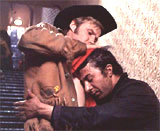

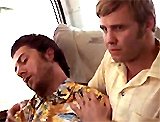
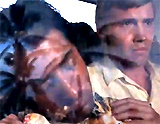
Joe Buck's Caring for the Dying Rizzo
|

|
Milk (2008)
- the shocking scene of Harvey Milk's (Sean Penn) 1978
assassination at the age of 48 by crazed fellow politician Dan White
(Josh Brolin)

|

|
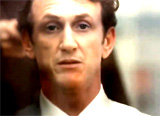
|
|
Harvey Milk's Assassination by Dan White
(Josh Brolin)
|
- the assassination scene was followed by
a flashback to Milk's prophetic words when he was celebrating his
40th birthday - musing to his lover: ("Forty years old, and
I haven't done a thing I'm proud of...I'll never make it to 50")
- and in the moving final
scene of the film, using a framing device, San Francisco
Supervisor Harvey Milk recorded his will by dictating into a cassette
tape recorder in 1977 in his kitchen, even predicting his own assassination,
but still striving for hope: ("You've got to elect gay people
so that the young child and the thousands upon thousands just like
him know there's hope for a better life - hope for a better tomorrow... I
ask this, that If there be an assassination, I would want five, ten,
a hundred, a thousand to rise. If a bullet should enter my brain,
let it destroy every closet
door. I ask for the movement to continue because it's not about personal
gain, and it's not about ego and it's not about power. It's about the
'us's' out there. Not just the gays, but the blacks and the Asians
and the seniors and the disabled. The 'us's'. Without hope, the 'us's'
give up. And I know you can't live on hope alone. But without hope,
life is not worth living. So you, and you, and you, you gotta give
'em hope. You gotta give 'em hope")
- a candlelight vigil and march
stretched for miles in tribute and honor to the brave, martyred
gay activist (and slain Mayor George Moscone (Victor Garber)) by
30,000 supporters who marched from the Castro district to City Hall
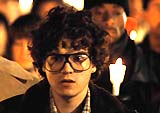
|
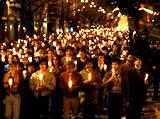
|
|
Candlelight Vigil and March in Tribute
|
- a number of title cards described
the tribute march, and Dan White's "Twinkie Defense"; White was found
"guilty of manslaughter, the minimum charge for both murders"; the
verdict set off 'The White Knight Riots' - the most violent uprising
in the history of the gay movement ("The next day, not a single arrest
was made"); in the aftermath, in 1984 after serving only five years,
Dan White was released from prison. Less than two years later, he
returned to San Francisco and committed suicide
|
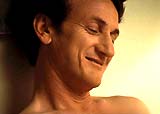
Flashback: Musing About His Age: "Forty Years Old, and I
Haven't Done A Thing I'm Proud Of"
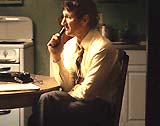
Recording Will in 1977
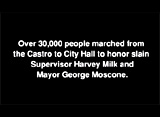
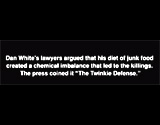
End Title Cards
|

|
Million Dollar Baby (2004)
- in the dark, emotionally-wrenching and controversial
ending of the melodramatic sports film, mentor/manager Frankie Dunn
(Clint Eastwood) finally honored paraplegic boxer Maggie Fitzgerald's
(Hilary Swank) request one evening. The irascible
but caring trainer Frankie entered her room and told her the meaning
of the Gaelic phrase on her green fight robe: "Mo
chuisle" ("Pulse of my heart" or "My pulse")
that cheering crowds had chanted.
- after kissing
her and saying goodbye (a tear ran down her cheek), he turned off her
life-support machine, unhooked her breathing tube and injected her
with an adrenaline overdose, to cause her instant death
- in the aftermath,
Frankie's silhouette exited from the hospital -
and from boxing altogether
|

Frankie's Exit From Hospital
|
